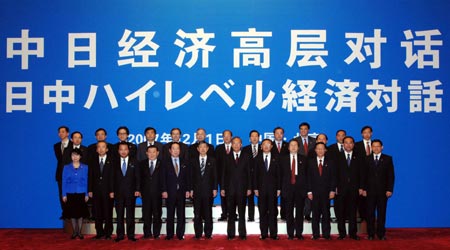
Chinese Vice Premier Zeng Peiyan (6th R Front) poses for
a photo with participants of the first China-Japan high-level economic dialogue
in Beijing, capital of China, Dec. 1, 2007. The first China-Japan high-level
economic dialogue was held in Beijing on Dec. 1. --Xinhua
China and Japan on December 3 jointly released a press communique on their
first high-level economic dialogue which was held over the weekend, confirming a
new mechanism for forging long-term reciprocal cooperation.
The press communique said that at the one-day dialogue meeting China and
Japan had "frank" discussions of issues concerning macro-economic policies,
trade and investment, climate change, environmental protection and multilateral
and regional economic cooperation and the two sides agreed to release a report
on their joint research about bilateral economic and trade cooperation in the
long term.
Gao Hong, research fellow with the Japan Research Institute of China Academy
of Social Sciences (CASS), said such bilateral all-round discussions, which
enabled the two Asian powers to exchange views on policies and more importantly
to fine-tune their economic, trade and energy ties, has demonstrated their
intent to cement political relationship by further developing and enhancing
economic and trade cooperation.
Further development of economic and trade cooperation could increase the
stability of the bilateral political relationship, Gao noted.
Japan is now China's third largest trade partner and the second largest
source of foreign direct investment. China is Japan's largest trade partner and
one of Japan's fastest growing export markets.
Zhang Jifeng, head of the Economic Office of the Japan Research Institute of
CASS, said China's rapid economic development has brought opportunities and
created huge market for Japan, and economic and trade cooperation between the
two sides is good for both in the long term.
Zhang commented that the press communique was forward-looking, strategic,
pragmatic and detailed beyond its confirmation that China and Japan saw their
relationship as "reciprocal", which was already a very high-key appreciation of
the past and present China-Japan overall relations.
The bilateral cooperation on energy conservation and environmental protection
is particularly a "shining point" in the communique since 6 out of 20 items of
the press communique are related to future bilateral efforts to deal with
related issues, Zhang said.
"Japan and China care much about climate change, environmental protection and
energy saving, Japan has outstanding technologies while China has huge demand
for relevant technologies. The two have common interests and enjoy strong
synchronicity here," said Zhang, adding the two countries will have bright
prospects on cooperation in this area.
The pragmatic and detailed measures in the communique also include those on
facilitating China-Japan trade on agricultural products, high technologies,
logistics and cooperation between Chinese and Japanese small and medium sized
enterprises and pushing forward cooperation on intellectual property rights
protection and in financial areas, said Zhang.
Zhang said despite positive progress, there are still harsh problems between
China and Japan, including the slowdown of bilateral trade volume growth,
decline of Japanese investment in China, barriers to technical cooperation,
Japanese failure to recognise China's full market economy, China's huge deficit
in its trade with Japan and the two countries' differences on the issue of the
East China Sea.
"Harsh problems remain and could not be solved through one or two mechanisms
or exchanges of visits, but the creation of a good and sound atmosphere is
critical to furthering bilateral ties," Zhang added.
The dialogue meeting was co-chaired by Chinese Vice Premier Zeng Peiyan and
Japanese Foreign Minister Masahiko Komura whose visit was considered the prelude
of Japan's new Prime Minister Yasuo Fukuda's upcoming visit to China.
The dialogue mechanism was jointly launched by Chinese Premier Wen Jiabao and
former Japanese Prime Minister Shinzo Abe during Wen's trip to Japan in April of
2007.
China and Japan agreed to convene the second dialogue by the end of 2008 in
Tokyo, the communique said.



